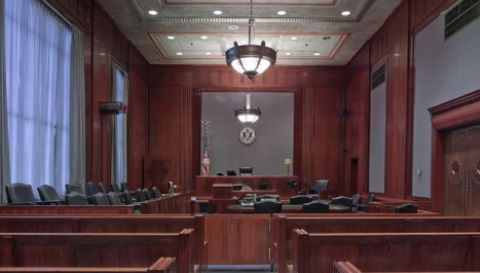
“Update to ‘Conflict U.’: Some Judges Are Recusing Due to a University Conflict” —
- “In July, Fix the Court released a report called “Conflict U.” that identified 24 federal judges who did not recuse in six dozen cases involving the universities where they also serve as law school instructors. This practice raises clear conflict-of-interest concerns, despite being sanctioned by judiciary policy.”
- “This past month, Fix the Court conducted follow-up research on this issue, and what we found was somewhat surprising: several judges with adjunct positions at law schools are, in fact, choosing to recuse when the law schools’ parent universities find themselves in their courtrooms. And at least one judge (we have another in mind but are double-checking) is recusing due a spousal connection to a university. N.B.: the Buescher and Koeltl examples were included in ‘Conflict U.,’ though the others were not.”
- “1. In June, D. Neb. Judge Brian Buescher recused in Mohammed v. Creighton University (filed 12/9/24; last filing 6/3/25; recusal order entered 6/2/25) likely because he serves as an instructor at Creighton University School of Law.”
- “2. In May, N.D. Ga. Magistrate Judge Anna Howard recused in Manuel v. Georgia State University (filed 5/5/25; last filing 6/16/25; recusal order entered 5/6/25). According to her LinkedIn profile (she’s a 2025 appointee, and her initial financial disclosure isn’t yet posted in the online database), Howard teaches at the University of Georgia School of Law, which, alongside Georgia State, is part of the University System of Georgia.”
- “3. In April, D. Mass. Judge William G. Young recused in Curtin-Wilding v. Trustees of Boston University (filed 2/21/25, last filing 8/27/25; recusal order entered 4/29/25). We believe the recusal occurred due to Young’s prior teaching at BU Law, from 1979 to 2020, which is mentioned in the defendant’s motion for recusal.”
- “4. In April, S.D.N.Y. Judge John Koeltl recused in Thomas v. New York University (filed 3/26/25; last filing 6/20/25; recusal order entered 4/1/25 [text-only in the docket]) likely because he serves as an adjunct at NYU School of Law.”
“Judge agrees to recusal in Oregon National Guard lawsuit after Trump Justice Department complaint” —
- “The federal judge overseeing a lawsuit to block the deployment of Oregon National Guard troops to Portland agreed Thursday to recuse himself after attorneys for the U.S. Department of Justice questioned his ability to appear impartial.”
- “U.S. District Court Judge Michael Simon’s spouse, Rep. Suzanne Bonamici, is a Democrat in Congress. Attorneys for the government argued in a court filing submitted Thursday that Bonamici has pushed back against President Donald Trump’s decision to federalize 200 Oregon National Guard troops to guard federal property in Portland, including the U.S. Immigration and Customs Enforcement Building south of downtown.”
- “‘To be sure, Defendants recognize that Judge Simon and Representative Bonamici speak for themselves, not for each other,’ the Justice Department filing stated. ‘Nonetheless, the unique factual, legal, and political role that Judge Simon’s spouse has played in the central events of this lawsuit may create the appearance of partiality.'”
- “In response, Simon issued a brief order stating he ‘does not believe that recusal is required under either federal law’ or a code of conduct for federal judges. Simon said ‘because it is necessary that the focus of this lawsuit remain on the critically important constitutional and statutory issues presented by the parties’ he would step aside. The judge noted the Justice Department raised the issue three days after an initial hearing and less than 24 hours before a hearing Friday on a restraining order to block the deployment.”
“Known Risk, No Coverage: Prior Knowledge Exclusion Applies Based on Probate Allegations” —
- “The United States District Court for the District of New Jersey, applying New Jersey law, has held that a prior knowledge exclusion barred coverage for a legal malpractice claim arising from a probate dispute because a reasonable attorney would have believed that the lawyer breached a professional duty or otherwise foreseen the potential for liability. Ascot Specialty Ins. Co. v. Mason, Griffin & Pierson, P.C., 2025 WL 2388433 (D.N.J. Aug. 18, 2025).”
- “In December 2020, the estate of a deceased client filed a probate action alleging that a lawyer assisted the deceased client’s wife in the misappropriation of estate assets. A few months later, the lawyer’s firm purchased a professional liability policy. The policy contained a prior knowledge exclusion, which barred coverage if, prior to the inception of the policy, an ‘Insured has any basis (1) to believe that any Insured breached a professional duty; or (2) to foresee that any such Wrongful Act or Related Circumstances might reasonably be expected to be the basis of a Claim against any Insured.'”
- “In January 2023, the estate filed a lawsuit alleging that the insured lawyer committed legal malpractice by ‘knowingly,’ ‘intentionally,’ or ‘negligently’ assisting in the tortious misappropriation of estate assets. The insurer denied coverage for the malpractice action under the prior knowledge exclusion.”
- “The court found that the probate action sought to disqualify the lawyer for conflicts of interest and his ‘knowing and intentional facilitation of’ tortious transfers. The court determined that those allegations alone demonstrated that a ‘reasonable attorney’ would either (1) believe that the lawyer breached a professional duty by allegedly assisting in the tortious transfer of estate assets; or (2) foresee that the lawyer’s alleged actions might reasonably be expected to be the basis of a future claim against any insured.”
- “The court noted that the malpractice action contained similar allegations as the probate action, further demonstrating that the insureds should have foreseen a legal malpractice claim against them. As such, the court held that the prior knowledge exclusion barred coverage for the malpractice action.”
